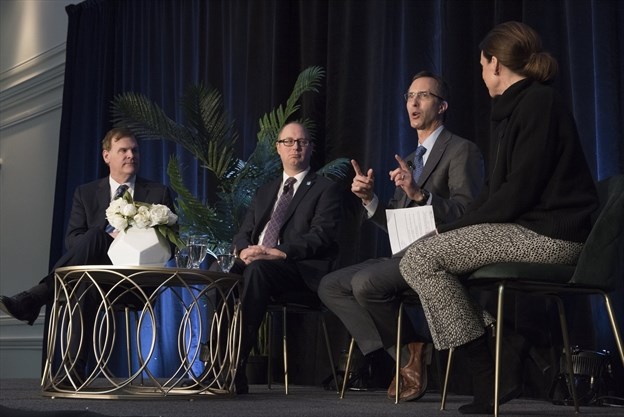The RBC senior economist noted the U.S. economy is still doing well and is expected to grow by 1.9 per cent this year.
“The fact that the labour market in the U.S. is very tight at 3.5 per cent it means the U.S. households are in good shape,” said Hogue.
“That tells us the risk of a recession in the U.S. is lessoning.”
All of this is good news for Canada as America remains this country’s largest trading partner.
Hogue noted the Bank of Canada is expected to lower interest rates once this year by one quarter of one per cent in an effort to simulate the economy.
He said the Canadian economy does not need that much stimulus as Canada’s unemployment rate as of December was sitting at 5.6 per cent.
“The bigger issue is a labour shortage in Canada,” said Hogue.
“The unemployment rate is going to stay low in Ontario so any kind of issues you have with labour shortages, having a hard time finding workers, these issues are not going to go away.”
Hogue also said companies need to start making plans for dealing with climate change-related emergencies such as fires and floods, which are happening more frequently and can impact business.
Those present also heard from Ipsos public affairs vice-president Sean Simpson who shared some of the market research firm’s data on how Canadians are feeling about their government and their prospects as they move into 2020.
He noted a recent survey found that only 45 per cent of surveyed Canadians believe Canada is heading in the right direction while only 50 per cent believe they are better off now than they were in 2015 (before the Trudeau government took office).
Simpson said 62 per cent of surveyed Canadians say they can’t get ahead while with 82 per cent stating things are becoming less affordable.
When asked to rank several issues in order of importance the number one issue chosen by those surveyed was health care, followed by climate change, housing and the economy.
John Baird, who previously served as Minister of the Environment under Prime Minister Stephen Harper and is now a senior business advisor with Bennett Jones LLP, discussed some of the geo-political risks Canada faces as it enters 2020.
These risks include Canada’s strained relationship with China, escalating tensions in the Middle East and Canada’s relationship with America, which Baird joked is probably at its lowest level since 1812.
Baird gave the Trudeau government credit on managing the North America Free Trade Agreement (NAFTA) file.
He said the renegotiation of NAFTA could only be bad for Canada, but said it worked out “less bad” than he predicted.
He argued the outcome has eliminated the uncertainty for the auto sector and the Canadian economy.
Baird also noted Canada should get used to dealing with Donald Trump as he expects the Republican president will be reelected.
Jennifer Watson of Watson Investments Wealth Management said the presentations were interesting and said she valued the different perspectives from the three speakers.
She said a survey question, discussed by Simpson, about being recession proof is something everyone needs to think about.
“We don’t know what happens in the future. We don’t know the exact timing, but we know there are things we can do right now to plan for that uncertainty,” said Watson.
“People should look at themselves and say, ‘Am I ready if something happens?”
STORY BEHIND THE STORY: We covered this event because we thought it was important for residents to know what kind of year economic experts are predicting for Canada and what challenges local businesses may face.


